
Europeans are warier of cryptocurrency than those in emerging markets, with cryptocurrency volatility playing a major role in their scepticism.
Research by London-headquartered cryptocurrency company Luno shows how, overall, almost half (47%) of Europeans are unconvinced about the profitability and safety of cryptocurrencies.
Contrastingly, people in emerging markets – South East Asia, South Africa and Nigeria – tend to be more favourable towards digital currencies such as Bitcoin and Ethereum. Almost four out of five (79%) responded that they are optimistic about their profitability.
A number of so-called stable coins, which are tied to fiat currency, have been launched in response to these fears.
Almost a third of those surveyed in Europe and emerging markets said that government oversight would have made them feel more positively about cryptocurrencies, leading to increasing calls for governments to regulate the ‘wild west’ of cryptocurrency.
The survey showed that investment is the main reason for purchasing cryptocurrency. Some 58% of Europeans and 82% of those in emerging markets put it above receiving payments and making online retail payments.
How well do you really know your competitors?
Access the most comprehensive Company Profiles on the market, powered by GlobalData. Save hours of research. Gain competitive edge.

Thank you!
Your download email will arrive shortly
Not ready to buy yet? Download a free sample
We are confident about the unique quality of our Company Profiles. However, we want you to make the most beneficial decision for your business, so we offer a free sample that you can download by submitting the below form
By GlobalDataIt suggests that cryptocurrencies still have some way to go before they are viewed as a viable means of exchange that could replace cash – in fact, just 21% of Europeans responded that they have received crypto as payment.
Cryptocurrency volatility a thorn in the side of adoption
Cryptocurrency volatility resulted in Bitcoin’s value soaring to a high of $20,000 in 2017 before a dismal 2018 saw it drop to a low of around $3,000.
In some cases, the value of a cryptocurrency can significantly change in the time that it takes for a transaction to complete, but faster blockchain technologies are eradicating these issues.
Emerging markets appear to be slightly more open to using cryptocurrency as a digital currency, with 29% saying they have received payments in crypto.
Cryptocurrency adoption in emerging markets has been boosted by government projects such as an African blockchain and digital currency initiative.
“It’s really interesting to see that even in times of uncertainty in the crypto market, consumers that don’t own any cryptocurrency are looking to get involved in the crypto space,” said Christian Zeiler, GM Europe from Luno.
“I still think there is a long way to go to get these consumers to buy cryptocurrency but we are leading the way in educating the general public in the benefits of cryptocurrencies and through our educational programmes and talks we hope that we can show the consumers that think cryptocurrencies are complicated that this is not the case and get them more involved in this evolving technology.”
Luno surveyed 500 people across seven territories who are aware of cryptocurrency or actively use it.
Read more: Seven blockchain startups going beyond cryptocurrency







